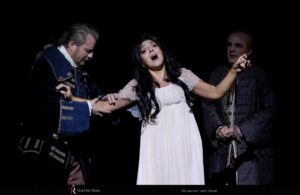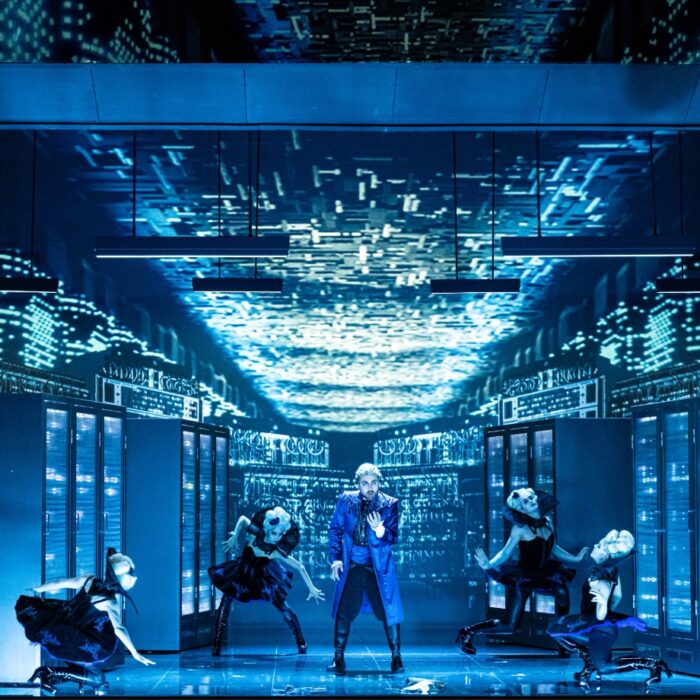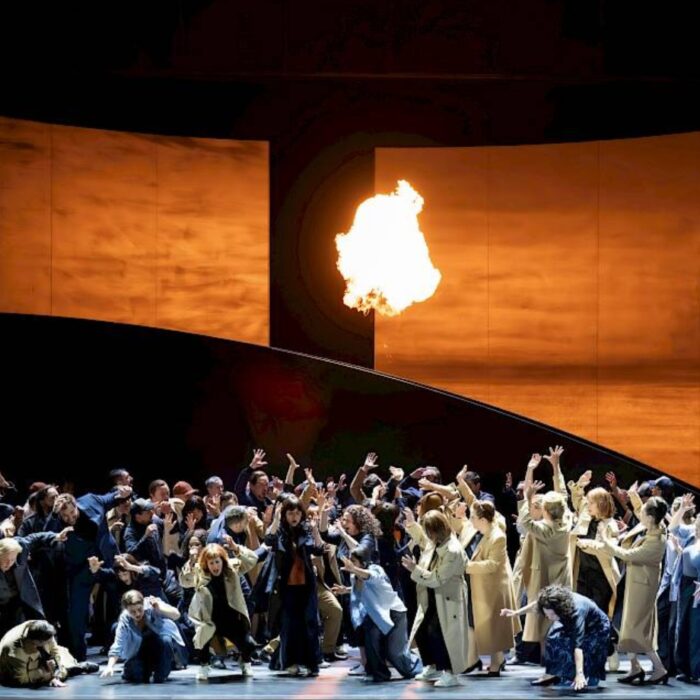
Teatro Real 2024-25 Review: Adriana Lecouvreur (Cast B)
By Mauricio Villa(Photo credit: Javier del Real)
And I’m back to report on the second cast for the Teatro Real de Madrid’s “Adriana Lecouvreur.” You can check my thoughts on Cast A here.
The Italian soprano Maria Agresta performed the titular role, Adriana. Her voice has developed into a pure lyric soprano, as a result of incorporating heavy roles in later years. She began her career singing “Norma,” “I Puritani,” and “La Traviata.” Her voice has gained power and her timbre has darkened, but she sang the role with her resources without pushing the voice to make it sound bigger or more dramatic. This role is usually sung by lyrico-spinto sopranos. Nevertheless, she showed her bel canto past in the pianissimi and diminuendo that she delivered in her entrance aria “Io son l’umile appena” which she sang with tender emotion. But Adriana’s role is written in the middle register, and Agresta’s middle section of her voice has become big and steady. Therefore she sounded really comfortable in the role and could focus on her acting and interpretation. She had no trouble with her spoken monologue in act three. It is not easy for opera singers to speak and sing during the same opera as it could change the position and emission of the voice, putting the singing at risk. Her performance was very dramatic, and switching to singing strongly and menacing for “che mai debba arrossir” to concluded the act with the spoken line “Chiedo in bontà di ritirarmi.” Her last act was full of sorrow and regret, beginning with her sense of abandonment. Her symptoms of being poisoned were very convincing, offering a moving dying scene which concludes in the arms of the tenor. She gave a performance of her fourth act aria, “Poveri Fiori,” full of pathos and depth.
The American tenor Matthew Polenzani performed the lover, Maurizio. He has been expanding his repertoire in later years by introducing Puccini and Verdi roles, after a long career of singing Mozart and bel canto. The problem is that his voice hasn’t developed to confront this kind of repertoire and therefore his volume is limited and his timbre too light. His first entrance, “Adriana!”, with the orchestra in a big fortissimo climax was inaudible, but Cilea’s orchestration is not heavy in general, and that saved his performance. His entrance aria, “La dolcissima effigie,” paid attention to every dynamic, singing in a whispering mezza-voce during lines like “Bella tu sei.” The problem is that his mezza-voce has a white quality, and it reminds one too much of his bel canto past, sounding more like Mozart. He continued singing beautiful mezza voce lines and diminuendo in his duet with Adriana, and it was noticeable that he was more comfortable singing light than when he had to sustain high notes in forte. His short second act aria, “L’anima stanca,” followed the same standards. He was obviously wonderfully comfortable in his top range and therefore the high B flats of the second act duet with Adriana sounded secure and sustained. This role is very well written for the tenor voice as the tessitura raises gradually from the first act where the highest notes are A flats, to the big, exposed B natural during the third act. But high notes are not a problem for Polenzani. He is clever enough to sing without pushing the sound or giving too much air pressure, making the voice sound more dramatic.
Spanish baritone Manel Esteve as Michonnet made an ardent interpretation of his first brief intervention, “Eccoci soli alfin!”, showing his steady vibrato, correct projection, and even timbre. His interpretation of his aria:” Ecco il monologo…” was very emotional, making big contrasts between the forte and pianissimi sections. He sang with beautiful lyricism the long expansive lines and proved the richness of his voice with a wide palette of colors. The rest of his interventions are mostly in ensemble, and therefore his part is dramatically important. He supports and helps Adriana during the whole fourth act, but his singing role is quite short.
Ksenia Dudnikova was the Princess of Bouillon. She has a powerful dark voice, with a marked vibrato and strong chest voice. Unfortunately her high range proved to be unstable and strained, the high G in “misura” showed signs of tension as her high A in “non mente” turned out to be plain and flat. But the vocal writing of the role is mostly central and low, and she offered a strong dramatic personification of Adriana’s nemesis.
Josep Fadó was incredible in the secondary supporting role Abate with a strong projected voice and a detailed characterization of his role, full of mannerism.


